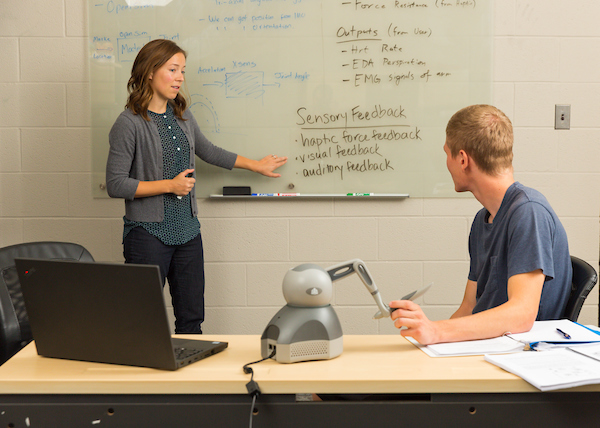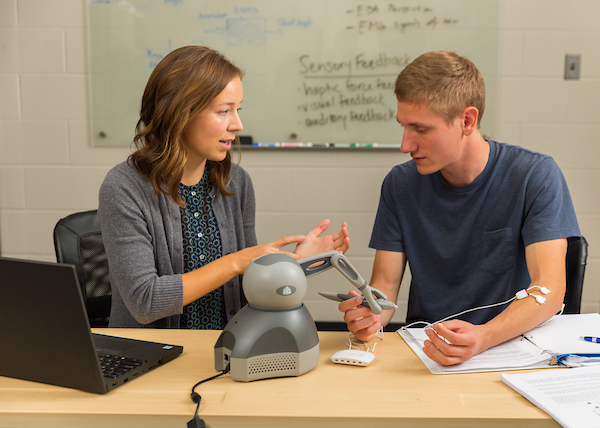Professor Reva Johnson ’09 Incites Cutting-Edge Research in Bioengineering Field
In fall 2017, Reva Johnson ’09, Ph.D., assistant professor of mechanical engineering and bioengineering, commenced her third year with the College of Engineering faculty. A passionate teacher and innovative researcher, she has embraced her new role, joining the ranks of accomplished faculty who inspired her as a student less than a decade ago and propelling the College of Engineering into the future.
“With the emergence of the bioengineering program, it was the perfect time to return to Valpo and be involved in shaping a program,” Professor Johnson says. “I have the opportunity to teach at a place that not only values teaching, but excels at it — and I get to do research. This is the ideal situation for me, teaching and doing research in topics that I love.” Professor Johnson enjoys working at the intersection of mechanical engineering and bioengineering. Her research involves human-machine interfaces and human learning, both movement learning and athletic performance. She brings a unique expertise and rehabilitation perspective to her research.
Prior to Valpo, she gained this strong background in rehabilitation research through her graduate work at the Rehabilitation Institute of Chicago, one of the premier rehab hospitals in the nation. She holds a Ph.D. and master of science in biomedical engineering from Northwestern University and a bachelor of science in mechanical engineering from Valparaiso University.
As a Valpo alumna, former student-athlete, and female engineer, Professor Johnson brings a distinct viewpoint to the classroom and to her research, connecting to her students on many levels. Recently, Professor Johnson collaborated with the women’s soccer team on a heart rate project.
The soccer team utilizes the Firstbeat system to track heart rate data in real time for games and training activities. Professor Johnson and her students analyzed the plethora of data generated, studying athletic training and associated fatigue and recovery. They specifically looked at the heart rate variability and recovery scores captured by the system to determine if training at certain times of day affects recovery levels. They found that late practices resulted in a 30 percent decrease in recovery that persisted for a few days.
This partnership between the bioengineering department and athletics is ongoing. From fitness level to body composition to stress level, fatigue and recovery are affected by innumerable factors. By analyzing data from Firstbeat, Professor Johnson and her students will assist Coach Marovich in the development of personalized training plans for his players.
Professor Johnson has also involved several students in the design of haptic devices, which communicate touch feedback to the user by applying forces or vibrations. They are developing ways in which feedback can be delivered to create a richer user experience. For example, haptic feedback would enable a person using a prosthetic arm to interact with it and accomplish tasks more precisely and accurately.
Combining his interest in rehabilitation and passion for video games, Robert Hemmerling ’18, mechanical engineering major, began a rehabilitative video game research project with Professor Johnson in spring 2017. He developed, programmed, and designed a haptic device in the form of a video game that pushes back on the user, requiring the user to overcome a force as a method of rehabilitation training.
The overarching purpose of the rehab video game is to make physical therapy more enjoyable and personalized. The game was specially crafted to require the use of wrist therapy movements to improve function while also motivating, challenging, and amusing the player. The project involves wearable sensors, which can measure a variety of bio signals, including heart rate, muscle use, muscle electricity, and skin conductance. Professor Johnson and Robert tested how variations in the game affected the player’s mental and physical workload, such as stress level and heart rate.
“This research experience has been an incredibly meaningful pursuit, and I am very thankful Professor Johnson has given me the opportunity to work with her,” Robert says. “I hope to dedicate my life’s work to alleviating the suffering of others, and Professor Johnson has introduced me to the many ways I can help others through the world of bioengineering.” At the conclusion of their summer research, Robert submitted an abstract on his research titled “A Haptic Video Game Designed to Study How Sensory Feedback Resolution Affects Mental Workload as Measured by Electrodermal Activity (EDA)” to a bioengineering conference. The abstract was accepted, enabling Robert to attend his first research conference.
Looking to the future, Professor Johnson anticipates studying different types of feedback, such as vibrations and sound. And with her athletics background, she hopes to use haptic feedback to aid in the perfection of an athletic skill.
“Projects that excite are those of personal interest,” Professor Johnson says. “I want to give my students as much freedom as possible. When they’re excited and personally invested, they’ll take projects in directions I never could have expected.”
